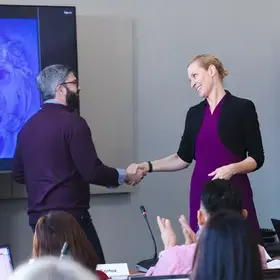Compared to writing code or systems engineering, empathy might seem like the epitome of a so-called “soft skill.” But for Meghan DeRocchis, the capacity to empathize is critical to successfully lead a digital transformation.
A veteran nurse practitioner with a diverse clinical background including oncology, DeRocchis specializes in informatics and electronic medical record (EMR) systems at the Columbia University Irving Medical Center. This combination of clinical and IT experience gives her the necessary empathy to bridge the divide between medical providers and the technologists creating new healthcare tools and products for them.
“You often have non-clinical builders or developers and clinical staff or patients as the end users,” DeRocchis said. “I’ve worked on both ends, so I can see both sides. It puts me in a unique position to lead these projects very effectively.”
Now a candidate in the Executive Master of Science in Technology Management at the Columbia School of Professional Studies, she is exploring ways to develop her dual perspectives to improve the efficiency and quality of healthcare—particularly in the midst of a global public health emergency.
You often have non-clinical builders or developers and clinical staff or patients as the end users. I’ve worked on both ends, so I can see both sides. It puts me in a unique position to lead these projects very effectively.
Meghan DeRocchis, '22SPS, Executive M.S. in Technology Management
DeRocchis became interested in informatics nearly a decade ago, when Winthrop-University Hospital was looking for a provider with chemotherapy experience who could help to implement an EMR system in their oncology practices.
“They needed to figure out how they were going to build all of these chemotherapy order sets and documentation,” she recalled. “I didn’t have an IT background, but I was tech savvy, and I was able to learn the IT on the job.”
Working with the EMR system vendors, DeRocchis helped to build a database of order sets specifying the complex treatment regimens to be used for patients. By drawing on her clinical experience, she was able to explain use cases and advocate for key features on behalf of her fellow providers.
“To a vendor, it might seem trivial that we’re insisting that something be highlighted in yellow on the screen,” she said. “But for safety reasons, it’s important. Sometimes it's a matter of translating, in a sense—just a conversation so that all of the different disciplines are on the same page.”
After going on to a data abstraction role at Flatiron Health, DeRocchis received a cold call two years ago from her current manager at Columbia, who recognized that her rare mix of informatics and oncology experience made her an ideal candidate to help the hospital transition to a new EMR system.
When she began to look at graduate programs to help her supplement her clinical degrees with an advanced business education, she was excited to find the program at SPS but was unsure if she was even eligible, given her lack of formal technology training. But the program’s admissions counselor assured her that she only needed professional experience in an industry where she saw the potential for digital transformation.
Now two months into her first term, DeRocchis has enjoyed the challenge of the coursework, the diversity among her cohort of impressive fellow students and the knowledge and approachability of the faculty. Although she was disappointed that the opening residency did not convene in Paris, as planned, she found the online program to be deeply engaging and has especially appreciated the executive lecturers and coaching resources available through the Career Design Lab.
With much still to look forward to, including working with her designated mentor to develop the thesis for her Master’s Project, DeRocchis is grateful for the chance to think broadly about the ways that technology might transform an industry that has been buffeted by the ongoing pandemic.
“Technology became our lifeline over the past several months, from groceries to remote school and work—it’s really what kept us all going,” she said. “For healthcare, telemedicine has been that lifeline. With the risks around COVID and other barriers to accessing healthcare causing people to delay medical care, telemedicine has become a critical resource for clearing that backlog and making sure people are being seen without putting themselves at risk. If we can better enable people to access medical attention and care using technology and telehealth, we can improve health outcomes and wellness overall.”
Learn more about the Executive M.S. in Technology Management program.


